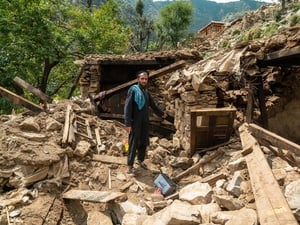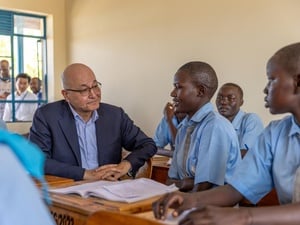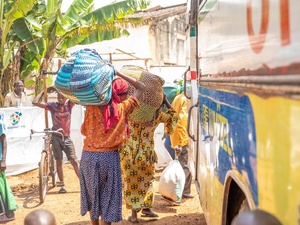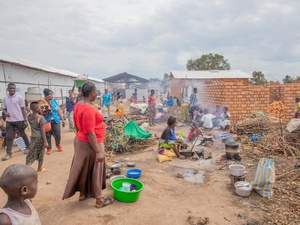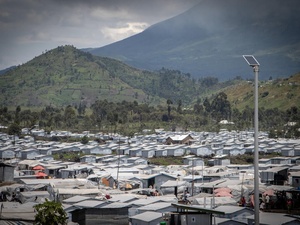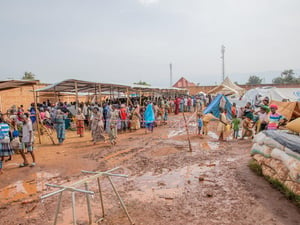Refugee numbers soar, as uncertainty in Burundi continues
Refugee numbers soar, as uncertainty in Burundi continues
While the coup attempt is reported to have been foiled, the situation in Burundi's capital Bujumbura remains tense with sporadic outbursts of violence reported this morning. Over 105,000 people have now fled the country to neighbouring Tanzania (70,187), Rwanda (26,300) and to the province of South Kivu (9,183) in the Democratic Republic of the Congo.
In Tanzania, the number of new arrivals has risen sharply over the last few days, with local immigration authorities reporting that over 50,000 Burundians are living rough in Kagunga on the shore of Lake Tanganyika, possibly even more. There are also reports of at least 10,000 people waiting to cross the border into Tanzania.
Kagunga is a small village on the border between Burundi and Tanzania. It is surrounded by a steep mountain range on the Tanzanian side and is best accessibly by boat. On 3 May, UNHCR chartered the ageing ferry MV Liemba and started to transfer the refugees from Kagunga to Kigoma. The ferry can only carry 600 people at the time and the entire transfer process takes as long as 10 hours. As the ferry is too large to dock in Kagunga, the refugees are brought to the ferry in several small fishing boats and it takes up to two hours to embark everyone on board. It is a 3-hour boat ride to Kigoma, where they also need to disembark with the help of smaller boats. We have now identified a second ship that can carry up to 300 people, but that will not be able to operate at night. We are also currently verifying a mountain track that some of refugees could take to leave Kagunga. That would involve a 4-hour hike to Kalinzi, where UNHCR will set up a transit centre for refugees to spend the night. The following day, they will be taken by bus to Nyanrugusu refugee camp.
With the rapidly increasing number of people arriving in Kagunga, the living conditions have become extremely dire. People managed to bring some food and can fish in the lake, but the lack of clean drinking water, latrines and shelter is acute. The local health services in the village are overwhelmed. We are now setting up a reception centre to address the most urgent needs. We are also fast-tracking the transfer of pregnant women, children, elderly and sick refugees to Kigoma.
In Kigoma, the authorities have made the Lake Tanganyika Stadium available to accommodate the refugees before they will go to Nyarugusu refugee camp. With the help of local partners, we have quickly turned the stadium into a large transit centre. Refugees will stay a few days at the transit centres, to undergo medical checks, vaccination if needed and to be registered, before being transferred to the refugee camp. 17 trucks with thousands of tents, plastic sheeting, mosquito nets, blankets, kitchen sets, jerry cans, solar lamps and other basic relief items, have left our regional warehouses and are expected to arrive on Sunday, as UNHCR and its partners are gearing up for a large scale refugee emergency. More than 18,000 refugees have been moved to the refugee camp to date.
Refugees from Burundi also continue to arrive in Rwanda, although the rate of arrival has decreased over the last two weeks. Refugees report that authorities in Burundi have made it very difficult for people to leave the country. According to those who have managed to reach Rwanda in the last few days, there are roadblocks and checkpoints where police or militia prevent people from continuing their journey towards Rwanda. Today, Rwanda is hosting more than 26,300 Burundian refugees most of whom are now living in Mahama refugee camp. In addition, an undetermined number of Burundians have settled in urban areas. We will start registering them next week.
For more information on this topic, please contact:
- In Dar-es-Salaam, Stephen Mhando on mobile +255 784 730 424
- In Kinshasa, Celine Schmitt on mobile +243 81 700 94 84
- In Kigali, Martina Pomeroy on mobile +250 (0)78 830 2769
- In Kigali, Erika Fitzpatrick on mobile +250 (0)78 838 9828
- In Nairobi (regional), Terry Ongaro on mobile +254 735 337 608
- In Geneva, Karin de Gruijl on mobile +41 79 255 9213


